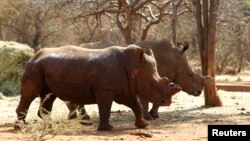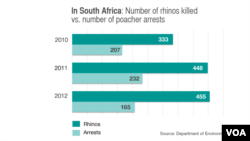JOHANNESBURG —
The number of South African rhinos killed by poachers rose nearly 50 percent this year to almost 1,000.
As of December 19, poachers had killed 946 rhinos in South Africa this year. The South African department of environmental affairs says 668 were killed in 2012. A decade ago, in 2003, only 22 rhinos were poached.
Richard Emslie, a scientific officer in South Africa with the International Union for Conservation of Nature, said, "It's a real crisis… for poaching to continue to escalate as it has done year on year is not sustainable."
He said the numbers don't bode well for the animals, which are being killed for their horns.
"At the rate poaching has been escalating continentally since 2008, we will reach the tipping point where deaths start to exceed births as soon as 2014 up to 2016, depending on the underlying growth rate of rhinos," said Emslie.
South Africa is home to 83 percent of the continent's rhinos, 73 percent of the world's population.
Although South Africa arrested 330 poachers in 2013, environmental experts say that rising demand makes the fight against poaching harder. A single rhino horn can sell for thousands of dollars.
China and Southeast Asia are the biggest markets for rhino horn, which many people consider to be an aphrodisiac.
Changing that perception has become a major focus for anti-poaching organizations and governments. There have been ad campaigns in countries such as Vietnam to educate people on the effect of poaching, and to explain that the horns are made up largely of the same material as human finger- and toe-nails.
Some organizations also are trying to find other jobs for South Africans who might be recruited to poach.
Emslie said the numbers should be a call to action for South Africans.
"It is a wakeup call, and the escalating poaching has been a wake-up call. it has been a matter of serious concern to rhino conservationists, not only in South Africa, but all the major rain states… if it continues, for example, continentally at the rate its been increasing since 2008, we could go down from 25,000 rhinos in Africa at the start of 2013 to under 10,000 at the turn of the decade. So we're really at the crisis point," said Emslie.
His hope is that more support will be given to anti-poaching groups.
"We're fortunate that there's a number of extremely dedicated people on the ground really doing their best to turn the tide, and we just have to hope that the international community helps rally together to give the people on the ground the support and resources they need," he said.
There also is new legislation to curb poaching. South Africa and Mozambique are exploring an agreement that would allow South Africa's anti-poaching officers to head into Mozambique while pursuing poachers.
Elsewhere in Africa, Botswana has banned all big-game hunting starting January 1.
As of December 19, poachers had killed 946 rhinos in South Africa this year. The South African department of environmental affairs says 668 were killed in 2012. A decade ago, in 2003, only 22 rhinos were poached.
Richard Emslie, a scientific officer in South Africa with the International Union for Conservation of Nature, said, "It's a real crisis… for poaching to continue to escalate as it has done year on year is not sustainable."
He said the numbers don't bode well for the animals, which are being killed for their horns.
"At the rate poaching has been escalating continentally since 2008, we will reach the tipping point where deaths start to exceed births as soon as 2014 up to 2016, depending on the underlying growth rate of rhinos," said Emslie.
South Africa is home to 83 percent of the continent's rhinos, 73 percent of the world's population.
Although South Africa arrested 330 poachers in 2013, environmental experts say that rising demand makes the fight against poaching harder. A single rhino horn can sell for thousands of dollars.
China and Southeast Asia are the biggest markets for rhino horn, which many people consider to be an aphrodisiac.
Changing that perception has become a major focus for anti-poaching organizations and governments. There have been ad campaigns in countries such as Vietnam to educate people on the effect of poaching, and to explain that the horns are made up largely of the same material as human finger- and toe-nails.
Some organizations also are trying to find other jobs for South Africans who might be recruited to poach.
Emslie said the numbers should be a call to action for South Africans.
"It is a wakeup call, and the escalating poaching has been a wake-up call. it has been a matter of serious concern to rhino conservationists, not only in South Africa, but all the major rain states… if it continues, for example, continentally at the rate its been increasing since 2008, we could go down from 25,000 rhinos in Africa at the start of 2013 to under 10,000 at the turn of the decade. So we're really at the crisis point," said Emslie.
His hope is that more support will be given to anti-poaching groups.
"We're fortunate that there's a number of extremely dedicated people on the ground really doing their best to turn the tide, and we just have to hope that the international community helps rally together to give the people on the ground the support and resources they need," he said.
There also is new legislation to curb poaching. South Africa and Mozambique are exploring an agreement that would allow South Africa's anti-poaching officers to head into Mozambique while pursuing poachers.
Elsewhere in Africa, Botswana has banned all big-game hunting starting January 1.





